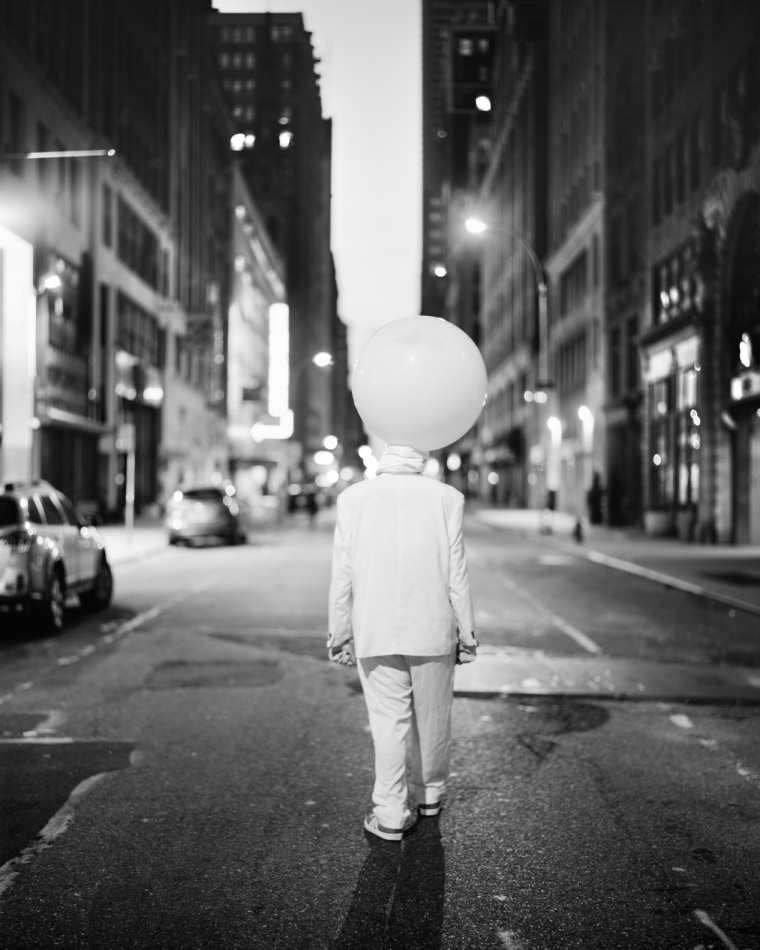The glitzy lights and pounding bass of the nightclub are not for everyone, but those unfamiliar with club culture, can now see New York City’s iconic club scene brought to life in "Manhattan Sunday," a contemporary tribute by photographer Richard Renaldi.
On display at Benrubi Gallery in New York City, black and white portraits and empty cityscapes illustrate a night out in Manhattan, an activity that has been more recently labeled as dead due to rising property prices and the closure of venues.
For Renaldi, who has been documenting in and out of Manhattan clubs since 2010, it’s a scene still very much alive.

“Sunday mornings are the quietest time of the week,” said Renaldi, who moved to New York from Chicago in 1986. “Usually Manhattan is crowded and full of this swirl of energy, but things kind of slow down on Sunday mornings. As a nightclubber, you’re coming home at the break of dawn out of a very high energy environment into this sort of transitionary period in New York when the city is still very still and peaceful. I wanted to tell that story and celebrate those characters.”
Renaldi captures these peculiar Manhattan hours by using a process similar to a box camera, where the photographer stands adjacent to the device after composing the shot, which can take several minutes to complete. A tedious technique that constructs an almost intimate relationship between photographer and subject, the result is a dreamlike performance.
“I started photographing inside nightclubs just after midnight,” Renaldi said. “Creating this narrative of the entire experience of going out with these extraordinary characters that you see kind of glamming out, being very sexual or whatever, just being part of that night experience.”

Gaining access to four or five “mixed to mostly gay” venues across Manhattan, Renaldi veers away from the more exclusively LGBTQ spots and focuses more on the sexual diversity and multiculturalism present in certain clubs, whether it’s a straight couple going dancing or a drag queen in full costume.
“Rather than straight or gay, you could look at it in a different way,” he said. “You could say that ["Manhattan Sunday"] focused more on house, deep house and dance music rather than techno or electronic dance music.”
Sexual inclusivity and a mixed clientele is a typical value found in club culture from its popular uprising in the 1970s. New York City, in particular, was hailed then as the club capital of the world, where the DJ spun disco or rock, providing a perfect platform for experimentation in sexuality or style.

Many factors changed the New York City scene in the 1980s, including the AIDS epidemic, which took a toll on club revenue but also saw nightclubs as places of congregation and escape for those that lived in fear, had lost loved ones or were simply alone. Seen as a haven for likeminded people, nightclubs additionally served as some of the strongest advocates for LGBTQ rights.
“These movements are tied directly to social gatherings where people felt comfortable,” Renaldi said. “Self-expression is a good word, because I think this is a way for people to express themselves in a safe space. Identity is a part of that, but I don’t want to get too tied to identity, because we’re living in an era of sub classifications to the point that I feel like it starts to divide the community rather than bring people together with our similarities. I think my view is more expansive and open.”
“Manhattan Sunday” feels like a project that Renaldi has been working toward his entire life, having visited his first nightclub at the age of eleven in the accompaniment of his parents.

Testament to that is “I Want Your Love”, an adjoining exhibit at Benrubi Gallery that shows Renaldi’s personal collection of nightlife imagery, shot through the 1980s up until today, mixing polaroids and iPhone photos for both historical and technological reference.
“Even though these technologies have changed the ways in which people socialize, they still want to be in a physical space together,” Renaldi explained.
“Manhattan Sunday” runs at Benrubi Gallery until December 23. In 2017, the exhibit moves to the George Eastman Museum in Rochester, N.Y..
“People often think that the scene is not like it use to be,” Renaldi said. “But I think this project proves that that’s not true. While the scene evolves or changes, and clubs open and close, the baton is still being passed form Studio 54 to Danceteria to the Sound Factory, and now it’s moving in some ways to Brooklyn. There are still these characters that are dressing up and going out, almost performing, and celebrating the part of their identity that is open and free.”
